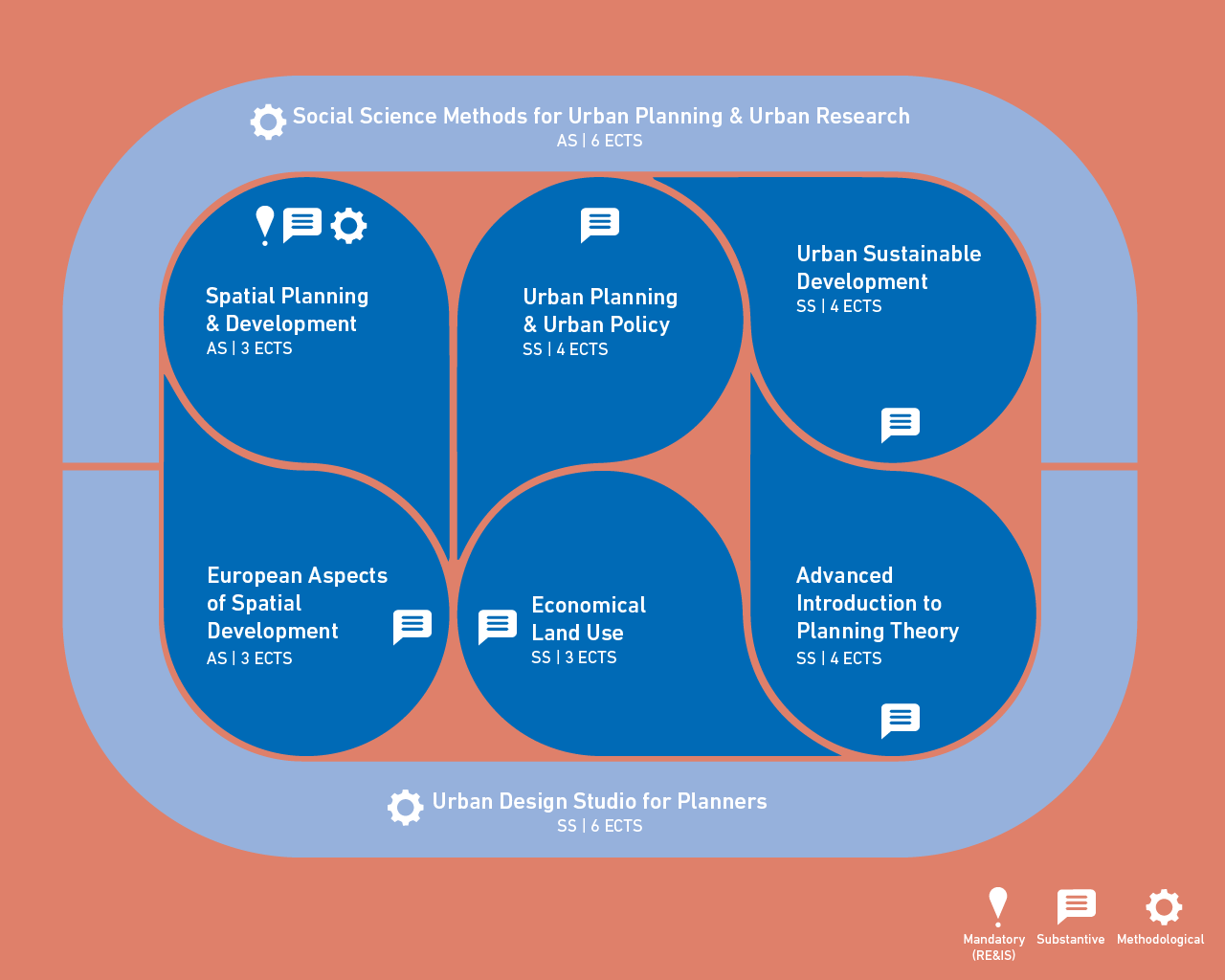Courses
The SPUR Research Group is involved in nine courses at the Master’s level and two courses at the Bachelor’s level. All courses concern spatial planning and policy in the Swiss and international context. They range from introducing theories of spatial planning, policy, and development to social science methods for urban research to a practice-based urban design studio.
Master's Level

103-0317-00L Autumn Semesters, 3 ECTS, Prof. Dr. David Kaufmann, Anouk Kuitenbrouwer
This course deals with the foundations of spatial planning. Based on the current and future challenges of spatial development in Switzerland and the international context, we discuss central planning tasks and intervention possibilities. The course is committed to the goals of sustainable spatial development and to the sustainable use of land as a limited resource. This is a mandatory course for students of the Spatial Development and Infrastructure Systems Master. The language of instruction is English.
103-0573-00 G Autumn Semesters, 4 ECTS, Dr. David Kostenwein, Dr. Michael Wicki
This course explores research methods used in urban planning and urban studies. Students will gain insights into both quantitative methods focusing on causal inference and qualitative methods that explore the depth and nuance of the urban. A special focus lies on learning from cases that apply the discussed methods. By the end of the course, students will be equipped to critically assess methods in urban planning and will produce their own research design. The language of instruction is English.
103-0569-00L Autumn Semesters, 3 ECTS, Dr. Ana Peric Momcilovic
Following the insight into historical perspective and contemporary models of governance and planning, the course focuses on the international dimension of spatial planning in Europe. This includes a discussion of how European spatial policy is made and by whom, how planners can participate in such a process, and how they can address transnational challenges of spatial development cooperatively. The language of instruction is English.
103-0020-00L Autumn Semesters, 16 ECTS, Prof. Dr. David Kaufmann, Claudia Sinatra, Nina Dettwiler
Interdisciplinary project activity is a key component of the master’s programme RE&IS. It is offered once a year in the Autumn semester as a joint course of the various chairs and institutes of the D-BAUG. Working in groups, students deal with a complex issue that goes beyond subject boundaries. The main aim is to encourage students to consider and plan housing developments, landscapes, infrastructure and traffic in an integrated manner. The project work is jointly supervised by the professorships of the degree program.
103-0570-00L Spring Semesters, 4 ECTS, Prof. Dr. David Kaufmann
We live in an urban and urbanizing world. This course is about key policy and planning issues that cities face and how various cities address them to plan for a sustainable and just common future. We cover the following urban planning and urban policy issues: Densification, affordable housing, transportation, climate change, smart cities, economic development, and migration. We approach each urban issue through a mix of in-class discussions, inputs from the lecturers, oral presentations as well as written reflections by students. The language of instruction is English.
103-0571-00L Spring Semesters, 4 ECTS, Dr. Sven Daniel Wolfe
This course explores urban sustainable development from the global to the local. In the context of the United Nations Sustainable Development Goals, we evaluate socio-spatial issues, challenges in defining and achieving sustainability, and explore mega-events like the Olympics and the Men’s Football World Cup. The language of instruction is English.
103-0572-00L Spring Semesters, 4 ECTS, Dr. Julio Da Cruz Paulos (Future Cities Lab Global)
Readings on contemporary planning theory provide a framework for discussing, analysing, and critically reflecting on planning and the planner's role. As we examine the role of theory in planning theory, we explore various conceptual frameworks and guiding principles. As a result of these frameworks, future urban and regional planners will be able to analyse, understand, and make informed decisions. The language of instruction is English.
103-0428-02L Spring Semesters, 6 ECTS, Anouk Kuitenbrouwer, Claudia Sinatra
This course is an introduction to urban design through design workshops, drawing tutorials and input lectures. The studio focuses on design principles and methodologies for achieving sustainable densification under challenging urban conditions. The studio format aims to engage students in design-led experimentation and follows an iterative process to develop spatial planning knowledge and graphic skills. Through synthesis of collective learnings, students develop a project-based exchange and the application of interdisciplinary ideas and techniques. The language of instruction is English.
103-0458-00L Spring Semesters, 3 ECTS, Dr. Reto Nebel
This course is dedicated to the current challenges for the economical use of land. The lecture presents instruments and procedures for the implementation of quality inward settlement development. This is considered on different planning levels. Various external guest lectures from research and practice complement the lecture. The language of instruction is German.
Bachelor's Level
103-0325-02L Autumn Semesters, 6 ECTS, Giovanni Di Carlo Alvarez, Dr. Felix Günther, Dr. Roman Streit
Methodological and practical principles of spatial development are taught from an integrated perspective (urban design, open space, transport) and applied by the students in the semester exercise in a Zurich neighbourhood as a spatial development concept. The language of instruction is German.
103-0313-00L Autumn Semesters, 6 ECTS, Dr. Gabriela Debrunner, Damian Jerjen (Professor of Practice), Yves Marc Räth, Jan Andri Monti di Sopra
This course provides an overview of spatial planning theory and practice, with a special emphasis on Switzerland. Covered topics include federal policy goals regarding spatial planning and sustainable spatial development, objectives, and instruments of spatial planning across various administrative levels, participatory planning approaches, as well as problem-solving techniques for spatial planning challenges. Additionally, a detailed case study focusing on a Swiss municipality will be covered in depth in the a planning exercise. The language of instruction is German.